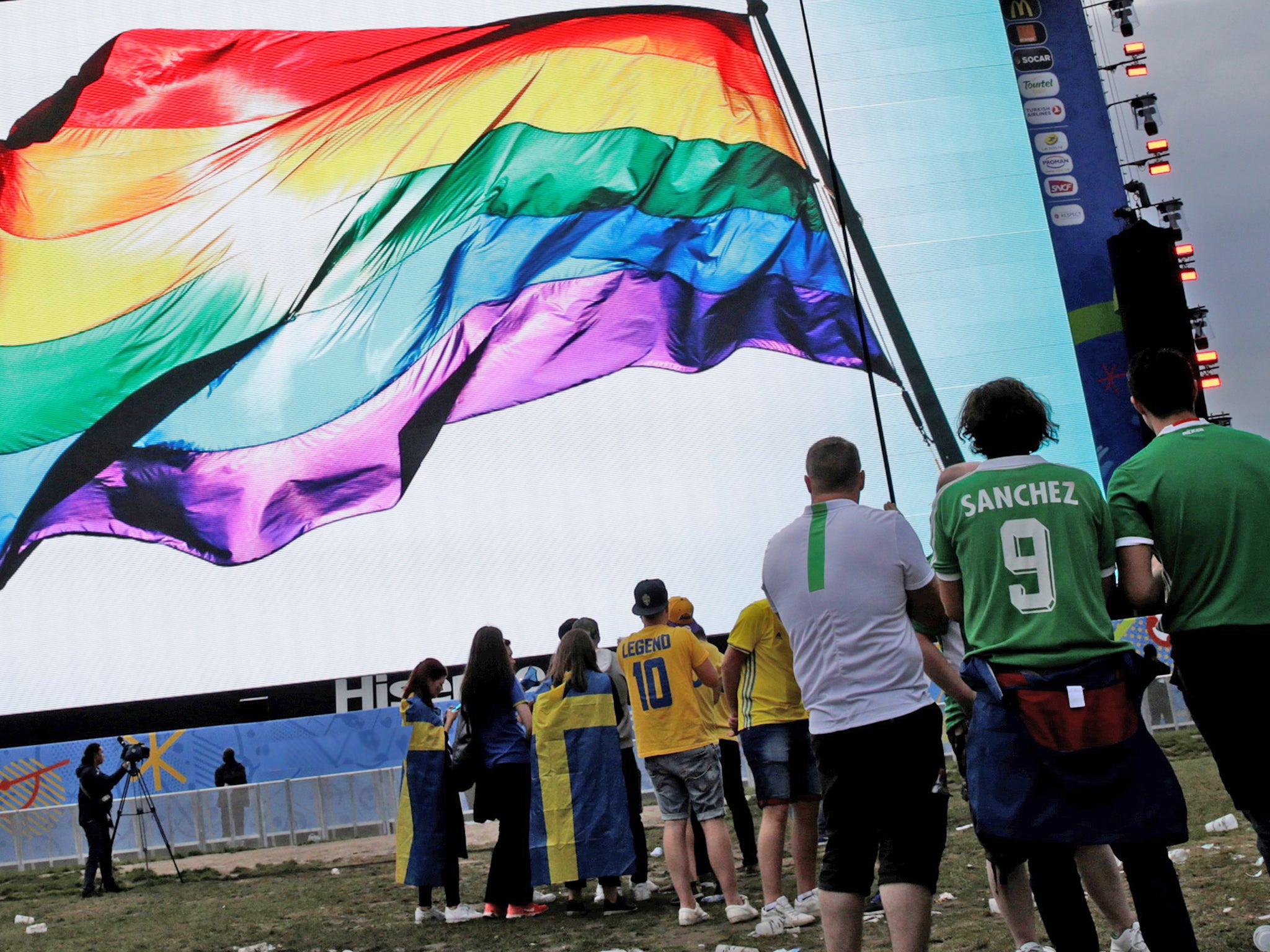The dark reality behind Russia's promise of an LGBT-friendly World Cup
‘The authorities will do everything to make sure the World Cup passes trouble-free, but when it does the discrimination, the homophobia and the laws will remain,’ says LGBT Sport Federation

Your support helps us to tell the story
From reproductive rights to climate change to Big Tech, The Independent is on the ground when the story is developing. Whether it's investigating the financials of Elon Musk's pro-Trump PAC or producing our latest documentary, 'The A Word', which shines a light on the American women fighting for reproductive rights, we know how important it is to parse out the facts from the messaging.
At such a critical moment in US history, we need reporters on the ground. Your donation allows us to keep sending journalists to speak to both sides of the story.
The Independent is trusted by Americans across the entire political spectrum. And unlike many other quality news outlets, we choose not to lock Americans out of our reporting and analysis with paywalls. We believe quality journalism should be available to everyone, paid for by those who can afford it.
Your support makes all the difference.For Alexander Agapov, 35, head of the Russian LGBT Sport Federation, the government has not always been an enthusiastic defender of LGBT rights.
He recalls being beaten by football fans as he waited for a bus – and how no proper investigation followed. He recalls the pressures organising LGBT football games in regional cities, only to see them cancelled at the last minute. He recalls the phone calls from security services, and numerous other such incidents.
But, according to Mr Agapov, the authorities have seemingly undergone a total conversion in time for this summer’s World Cup. Under the watchful eye of Fifa, Russia’s bureaucrats are, apparently, now fully signed up to the principles of tolerance and non-discrimination. For one month at least, Russia’s “traditional values” are being put to one side, and the most pernicious interpretations of a 2013 law banning “propaganda of non-traditional sexual relations among minors” forgotten.
Official statements have been bold enough. The Russian Football Union’s Alexei Smertin, a World Cup ambassador, said there would be no bans on rainbow flags or same-sex partners showing affection. “You can kiss all you like, and hug one another, within the bounds of normal reason,” he has said. Similar assurances have come from the organising committee.
The prospect of a gay-friendly competition taking place in Russia would usually provoke howls of derision from its ultraconservative voices. But not this time.
Russia’s most prominent anti-gay campaigner, Vitaly Milonov, the outspoken deputy of the State Duma, has built a career on homophobic remarks. But in comments to The Independent, he was strangely non-committal. He claimed that Russian supporters would never do such things as show rainbow flags in stadia. But it was not up to him to tell officials like Mr Smertin what the Russian policy should be. And he would not be staging any personal protest either.
Reverting to his usual discriminatory language, almost as an afterthought, Mr Milonov added: “We have never persecuted people on account of their Satanic sexual perversions.”
Piara Powar, director of the Football Against Racism in Euope (FARE) network, an equality pressure group working with Fifa, said the Russian guarantees for LGBT appear serious enough.
“We have been given forceful assurances that people’s safety in and out of stadia will be taken care of,” he told The Independent. “We are treating the assurances with caution, given past history, but Russia is in the spotlight and it does understand what is at stake.”
Nonetheless, Mr Powar said LGBT supporters would be wise to avoid displays of affection in public given the danger of random attacks.
Russia remains a difficult and dangerous place for sexual minorities. A vibrant gay scene exists in many of its major cities, and its younger generation is more tolerant. But several years of state-sponsored homophobia have had an effect on the general population. Since the controversial 2013 anti-gay law was passed, the number of recorded hate crimes has doubled. Polls also indicate a growing intolerance of LGBT communities.
In more lawless corners of the Russian Federation, the situation is uglier. Last year, credible reports emerged from the largely Muslim republic of Chechnya suggesting more than 100 men were tortured on account of their sexuality. At least three died; many are still missing.
Alexander Kondakov, a researcher at St Petersburg’s Centre for Independent Social Research, said the tournament has the makings of a toxic cocktail.
“You have a tournament celebrating hyper-masculinity taking place in a country where the government is actively supporting hatred with rhetoric and legislation,” he said. “Then you add alcohol into the mix.”
Violence against LGBT supporters was not only possible but likely, he added.
According to Mr Kondakov, Russian activists have welcomed the Kremlin’s discovery of LGBT rights. But there are few illusions that it will lead to a change in direction, or a new inclusive or positive agenda. “The rare positive steps we see usually end with the most ordinary of homophobia,” he said.
Indeed, far from providing a springboard for local LGBT rights, the World Cup has arguably played into anti-gay propaganda, said Mr Agapov.
“By emphasising the safety of foreign LGBT fans, authorities have managed to present homosexuality as something foreign, un-Russian,” he said. “Clearly, they will do everything to make sure the World Cup passes trouble-free, but when it does the discrimination, the homophobia, and the laws will remain.”
Join our commenting forum
Join thought-provoking conversations, follow other Independent readers and see their replies
Comments